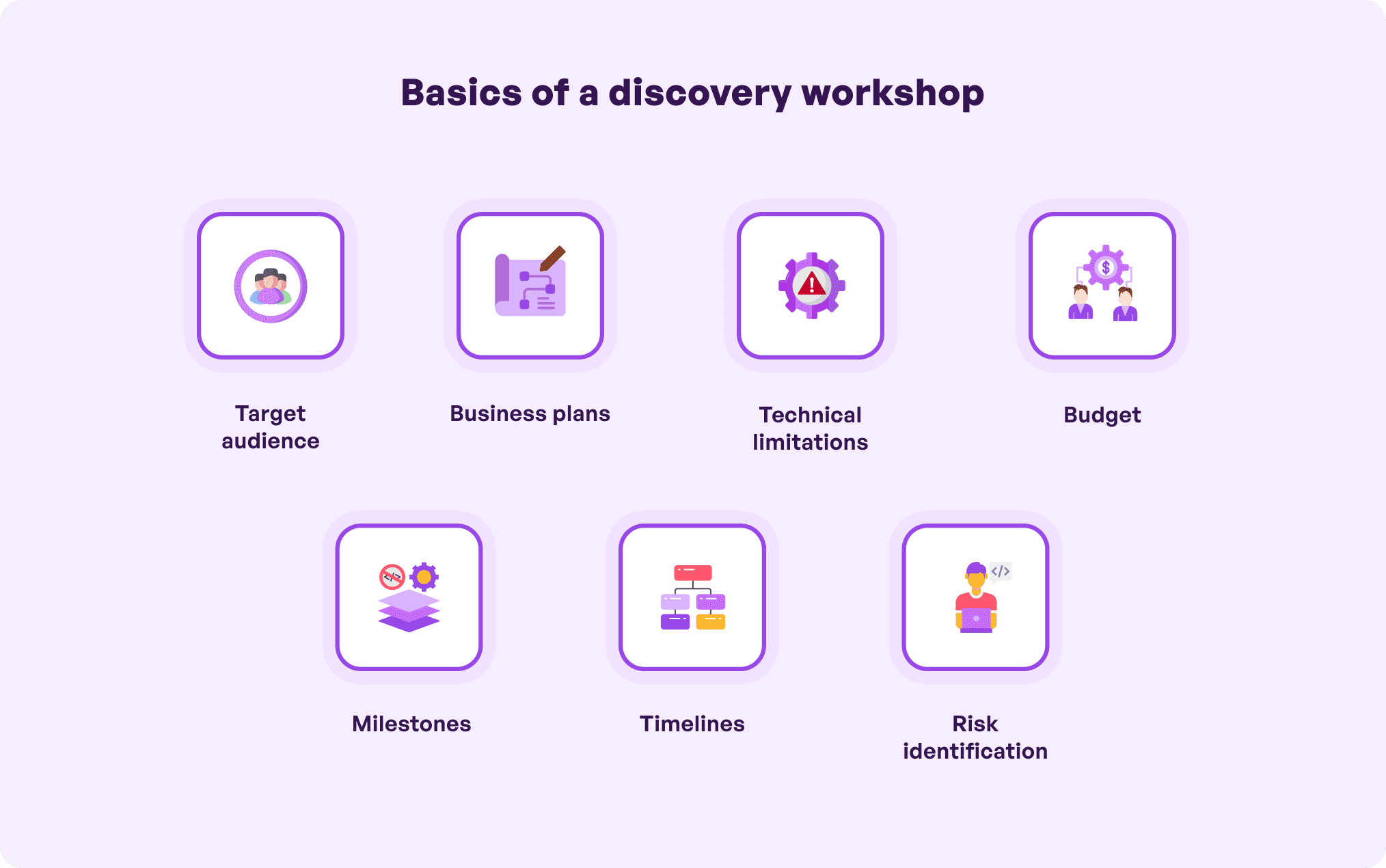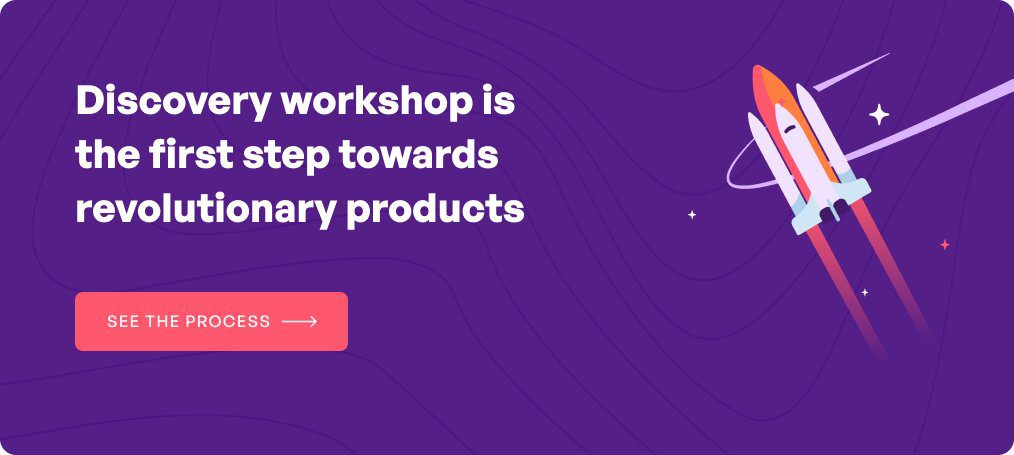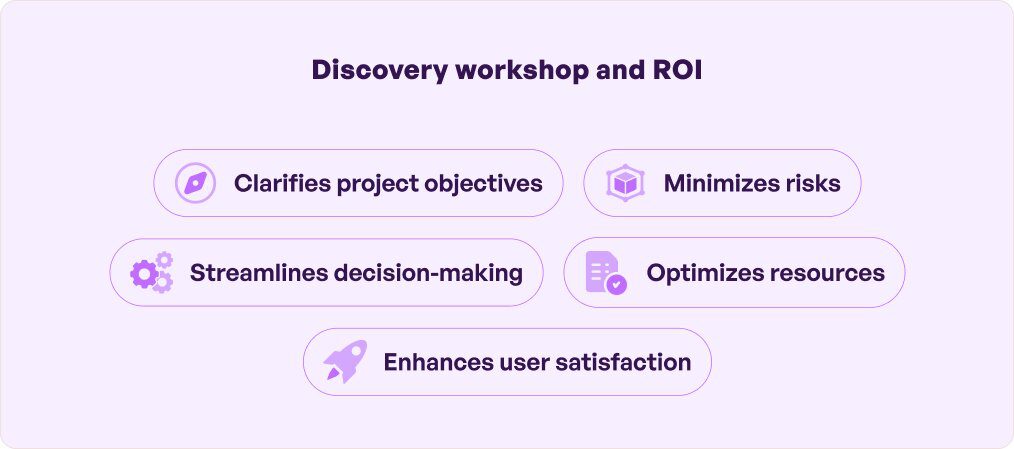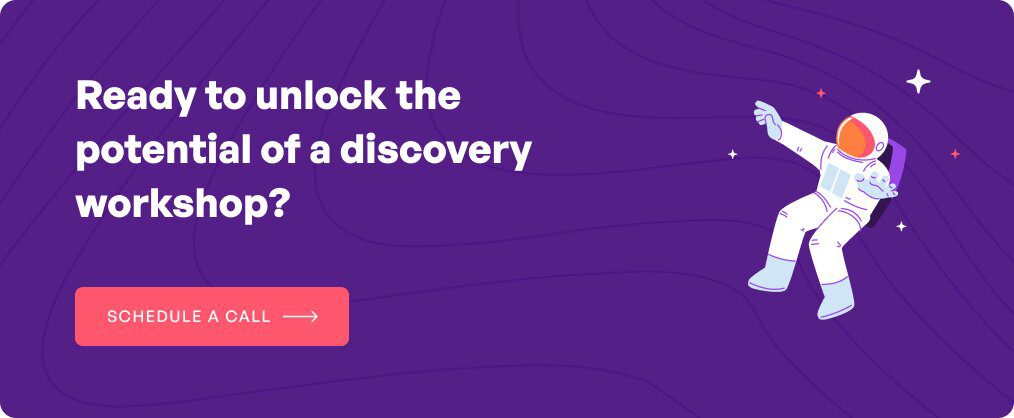Building a mobile app without a clear plan is like setting sail without a map—you’ll drift off fast. That’s where a discovery workshop comes in, laying the foundation for your app’s success by aligning business goals, user needs, and technical feasibility. In just a few hours, it can save months of rework, ensuring that your team is on the same page before a single line of code is written. This is made possible with a discovery workshop which is an opportunity for businesses and development teams to work together to build or refine software. It typically brings the project managers, stakeholders, developers, and designers in one place to ‘discover’ the needs. The value of discovery workshops is well established by a study that revealed that 45% of businesses fail within the first year due to a lack of planning and little financing.
Besides laying a strong product foundation, a product discovery workshop is also helpful if you wish to tweak an existing solution. It helps you stay ahead in terms of market acceptance and technical viability. Top-notch companies, like Simublade, tend to offer both pre and post-workshop support to ensure a lucrative outcome. Let us have a detailed look at how these services can have a positive impact on revenue and ROI.
Table of contents
What is a product discovery workshop?
A discovery workshop is a collaborative session held at the beginning of a project to define its key requirements. This will include the brand’s goals, vision, scope, budget, milestones, technical limitations, target audience, and potential challenges. The process is critical to avoid missing crucial updates, lapsed deadlines, and overdoing project boundaries. It typically involves stakeholders, project managers, designers, and developers coming together to align on the project’s objectives and user needs.
 It helps clarify expectations, prioritize features, and ensure stakeholders are on the same page. The discovery workshop process also allows teams to explore different ideas and generate solutions.
It helps clarify expectations, prioritize features, and ensure stakeholders are on the same page. The discovery workshop process also allows teams to explore different ideas and generate solutions.
By the end of the session, a clear product roadmap is typically established, with a shared understanding of the next steps. The result? A process that reduces miscommunication, improves collaboration and ensures that the project starts with a well-defined vision and strategy, ultimately saving time and resources later in the development process.
Let us take a closer look at the benefits:
Here are the expectations or the core benefits of a discovery workshop:
- Aligns project vision: Ensures all stakeholders have a clear, and shared understanding of goals and expectations along with discussing expectations, insights, and priorities. This eliminates ambiguity, resolves conflicting viewpoints, and ensures that team members are working toward a unified vision.
- Clarifies scope: During the session, stakeholders discuss what needs to be built, what functionality is essential, and what constraints (such as time, budget, or technical limitations) must be considered. This process helps prioritize key features, differentiate between “must-haves” and “nice-to-haves,” and establish clear boundaries for what will be included.
- Identifies risks early: Highlights potential challenges and risks, allowing for proactive planning. This means integration difficulties, scalability issues, or unclear user requirements are identified. By surfacing these risks at the outset, the team can plan mitigation strategies, allocate resources effectively, and adjust the project timeline or scope as needed, reducing the likelihood of costly surprises.
- Creates a roadmap: A product discovery workshop creates a roadmap by outlining key milestones, deliverables, and timelines which helps in project management later. These elements are organized into a structured plan and the roadmap provides a clear path forward, ensuring that all team members understand the project’s direction and deadlines.
- Validate assumptions: This is done by allowing stakeholders to test and challenge initial ideas, requirements, and business goals through a joint discussion. Participants, including developers, designers, and users, review key assumptions about the target audience, desired features, and technical feasibility. Through brainstorming, user journey mapping, and prototype exploration, the team can confirm whether these assumptions align with real user needs and project constraints.
In a nutshell, by fostering partnership and refining the overall project vision, a discovery workshop sets a strong foundation for smoother execution, thus saving time and resources in the long run.
What are the main goals of a discovery workshop?
The main goals of a product discovery workshop are to align all stakeholders, define project objectives, and establish a clear roadmap for the project’s development. By gathering the input from the following, the workshop helps ensure that everyone has a futuristic vision of the project and desired outcomes:
- business leaders
- developers and designers, and
- customers or end-users
As a business, your discovery workshop expectation should be an early alignment which is crucial for minimizing communication gaps and ensuring that all team members are working toward the same goals, right from the beginning.
Another key goal is to clarify the scope of the project. During the workshop, stakeholders prioritize features and requirements, distinguishing between what is essential and what is optional. This helps set realistic expectations for deliverables, timelines, and budget, while also reducing the risk of scope creep. By clearly defining the project’s boundaries, the team can focus on the most critical aspects without wasting resources on unnecessary elements which is also one of the unique benefits of a discovery workshop.
 What to expect from a discovery workshop? Well, it helps identify potential risks like market, technical, security, and legal risks that might arise during development. By discussing technical constraints, user needs, and market conditions, the team can foresee possible roadblocks and plan mitigation strategies. Overall, the workshop aims to create a well-defined project plan, improve collaboration, and set the foundation for successful project execution.
What to expect from a discovery workshop? Well, it helps identify potential risks like market, technical, security, and legal risks that might arise during development. By discussing technical constraints, user needs, and market conditions, the team can foresee possible roadblocks and plan mitigation strategies. Overall, the workshop aims to create a well-defined project plan, improve collaboration, and set the foundation for successful project execution.
What does an effective workshop at Simublade look like?
At Simublade, a leading software development company with unparalleled discovery workshops, we offer plenty of services to help businesses get their desired idea within 4 to 5 weeks. Our team helps align business’ product vision with user needs and market demands with end-to-end support like:
During Workshop:
- In-depth business analysis
- Extensive brainstorming
- Project plan creation
Pre Workshop:
- Initial project understanding
- Workshop preparation guidance
- Preliminary research
Post Workshop:
- Detailed roadmap delivery
- Feedback collection mechanism
- Outcome review and iteration
Our steps in a successful discovery workshop are – Goal setting, target market study, project ideation, priority-based features finalization, UI/UX planning, tech stack and API validation, and cost and timelines planning. We further conduct ideation, implementation, integrations, and interpolations.
Lastly, with a focus on documentation, structural clarity, technical assessment, functional prototypes, and cybersecurity KPIs, the workshop ensures seamless integration and cost-effective project execution. Further, we unlock the product’s potential with real customer feedback within 1 month.
Simublade additionally prioritizes features for MVP development and conducts phase two planning while developing a detailed roadmap with clear budgeting and timelines. This specific discovery workshop process guarantees that all stakeholders are aligned and that the product is both market-ready and technically feasible. In short, we successfully turn the ‘what ifs’ into ‘what’s next’.
How does a discovery workshop help with ROI?
Here are five discovery workshop ROIs:

- Clarifies project objectives: It clarifies project objectives by gathering all stakeholders to discuss the overall vision, goals, and expectations for the project. This cooperative process ensures that everyone is aligned on key deliverables, timelines, and success metrics. The product discovery workshop further breaks down complex ideas into specific, actionable tasks, defining the scope and prioritizing features that have a positive impact in the long run.
- Minimizes risks: A discovery workshop lowers risk by identifying potential challenges early, such as technical limitations, market demands, or resource constraints. Through unified discussions, it clarifies assumptions and surfaces issues that could derail the project later. This proactive approach allows teams to devise mitigation strategies with cybersecurity services, adjust project scope, and align on realistic goals, reducing the likelihood of costly delays and boosting ROI.
- Streamlines decision-making: It streamlines decision-making by ensuring stakeholders engagement in workshops. It helps discuss and align project goals, features, and user needs in a structured setting. This environment allows for quick resolution of uncertainties, validation of assumptions, and prioritization of essential features.
- Optimizes resources: A discovery workshop optimizes resources by prioritizing the most critical features and eliminating unnecessary ones early in the project. It helps teams avoid wasting time and money on low-impact or unfeasible ideas by aligning on key objectives and validating assumptions. By identifying risks and technical challenges upfront, the workshop ensures that time and budget are allocated efficiently, focusing on high-value areas.
- Enhances user satisfaction: A discovery workshop enhances user satisfaction by ensuring that the project is designed around real user needs and pain points. During the workshop, stakeholders explore user personas, behaviors, and expectations, which helps prioritize features that address these needs. By refining the product’s goals to align with user requirements, the final solution is more likely to deliver value, resulting in a better user experience and ROI.
Conclusion
You can summarize that the discovery workshop is something that brings clarity at the start of a project through the enlightenment of objectives, alignment of stakeholders, and making the roadmap clear. This does away with risks, prioritizes features, and validates assumptions so the final product meets the business goals and user needs. This is what a discovery workshop does in order to enhance the ROI on a project by making it possible for individuals to collaborate and providing a solid base that matches up with the development.
FAQs
Q. What is a discovery workshop, and why is it important?
Ans. A discovery workshop is a combined session where stakeholders, developers, designers, and investors come together to define a project’s goals, scope, and requirements. It is critical because they establish a clear roadmap, improve decision-making, and help create a user-centric product, ultimately increasing project success and ROI.
Q. How does a discovery workshop impact project ROI?
Ans. A discovery workshop process clarifies project goals and requirements, ensuring alignment among stakeholders, which significantly reduces the chances of costly changes later. This focused approach enhances efficiency thus positively impacting ROI.
Q. What expectations should stakeholders have for a discovery workshop?
Ans. A clear understanding of project goals, user needs, and potential challenges is what to expect from a discovery workshop. They must also anticipate brainstorming and idea prioritization that will guide the project’s direction.
Q. How does a discovery workshop influence the overall timeline of a project?
Ans. A discovery workshop helps identify top requirements and potential roadblocks early on which allows for more accurate project timelines. By establishing a clear direction and prioritizing tasks, it can streamline subsequent phases and reduce delays.
Q. How does a discovery workshop help in risk mitigation?
Ans. A discovery workshop will identify potential risks like figuring our costs early in the project thus letting developers to address them promptly. With communication, the value of discovery workshops lies in encouraging diverse perspectives that can uncover hidden issues before they escalate.
Q. How long does a typical discovery workshop last, and what factors influence its duration?
Ans. A typical discovery workshop at leading companies like Simublade takes not more than 4 to 5 weeks. This duration is influenced by project complexity. Additionally, the level of prior research and preparation done can significantly impact how much time is needed for effective discussions.
Q. How can skipping a discovery workshop affect a project?
Ans. Not paying heed to a discovery workshop can lead to misunderstandings about project goals and user requirements, resulting in misaligned expectations among stakeholders. This may cause costly changes later, extended timelines, and ultimately build a product that doesn’t meet market demands.




